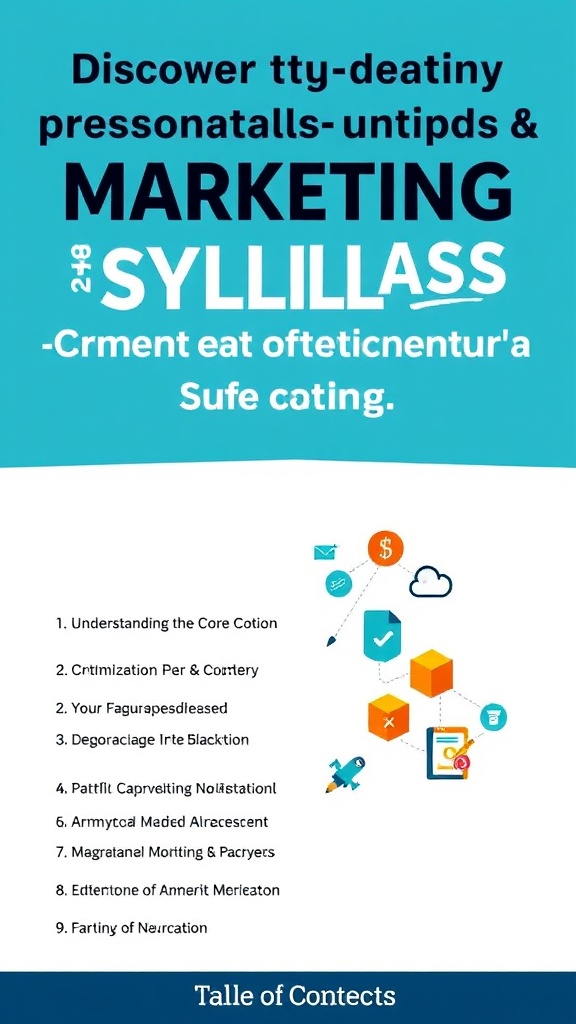Discover the Essential Elements of a Marketing Online Class Syllabus That Guarantees Student Success
Discover the Essential Elements of a Marketing Online Class Syllabus That Guarantees Student Success
In my experience with designing and teaching online marketing courses, I’ve found that Marketing Online Class Syllabus plays a pivotal role in student success. When I first started developing my syllabus, I realized that clarity, structure, and engagement are the keys to keeping students motivated and on track. That’s why I want to share what I’ve learned about creating a Marketing Online Class Syllabus that truly supports learning and growth.
Over the years, I’ve discovered that a well-crafted Marketing Online Class Syllabus not only guides students but also sets the tone for the entire course. From what I’ve learned, including specific elements like clear objectives, detailed schedule, and assessment criteria can make all the difference. I hope my insights help you develop a syllabus that guarantees student success and enthusiasm for marketing.
Understanding the Core Components of a Marketing Online Class Syllabus
Defining Clear Course Objectives
From my research and experience, I’ve learned that the first step in creating an effective Marketing Online Class Syllabus is to set clear, measurable objectives. I recommend spending time to articulate what students should achieve by the end of the course. When I include specific goals like understanding digital marketing strategies or mastering analytics tools, I notice students become more focused and motivated.
In my opinion, defining precise objectives helps both educators and students stay aligned. I always ensure that each learning outcome is achievable within the course duration, which boosts student confidence and success. I believe that a Marketing Online Class Syllabus with well-defined goals is the foundation of a successful course.
Structured Course Schedule and Timeline
One of my favorite parts of designing a Marketing Online Class Syllabus is creating a detailed schedule. I’ve found that breaking down topics week-by-week with deadlines helps students manage their workload. When I include a timeline for lectures, assignments, and exams, students tend to stay organized and less overwhelmed.
From what I’ve experienced, transparency about deadlines and expectations reduces confusion and increases accountability. I recommend incorporating a clear calendar within your Marketing Online Class Syllabus so students know what’s coming and can plan accordingly. This structure ultimately enhances their chances of success.
Essential Elements of a Marketing Online Class Syllabus
In my practice, I include essential elements such as grading policies, communication channels, and office hours. I believe these components provide clarity and support for students navigating an online environment. When I include detailed grading rubrics, students know how their work will be evaluated, which motivates better performance.
Based on my experience, a comprehensive Marketing Online Class Syllabus that clearly states policies on late work, participation, and academic integrity helps prevent misunderstandings. I recommend making these policies transparent from the start to foster trust and fairness in the course.
Designing an Engaging Marketing Online Class Syllabus
Incorporating Interactive Content
From what I’ve learned, engaging students in an online course requires more than just lectures. I discovered that including interactive elements like discussions, quizzes, and group projects within your Marketing Online Class Syllabus keeps students active and interested. I recommend designing activities that encourage collaboration and real-world application, which I’ve seen boost retention and enthusiasm.
In my experience, clear instructions on how to participate in these activities, included directly in the syllabus, make a big difference. When students understand what’s expected, they’re more likely to participate actively, leading to a richer learning environment.
Using Visual and Multimedia Elements
I’ve found that integrating visual aids and multimedia resources into the Marketing Online Class Syllabus can significantly enhance understanding. I recommend specifying which videos, podcasts, or infographics students should review and how these relate to the course goals.
From my research, providing multimedia links directly in the syllabus helps students prepare better for each module. I believe that a visually appealing and multimedia-rich syllabus can motivate students and create a more dynamic online learning experience.
Personalizing the Syllabus to Your Course Style
In my experience, tailoring the Marketing Online Class Syllabus to reflect your teaching style and course personality makes a big impact. I recommend adding a personal welcome message or a brief video introduction to connect with students early on. This personal touch helps foster a sense of community, even in a virtual environment.
I've discovered that when students see the instructor’s personality reflected in the syllabus, they feel more engaged and motivated. I believe that a personalized syllabus can be a powerful tool for building rapport and encouraging student success.
Incorporating Effective Assessment Strategies in Your Marketing Online Class Syllabus
Designing Clear and Fair Grading Criteria
In my practice, I always emphasize transparency in grading policies within the Marketing Online Class Syllabus. I recommend providing detailed grading rubrics and examples to clarify expectations. When I include specific point distributions for assignments, quizzes, and participation, students know exactly what they need to succeed.
From what I’ve learned, clear criteria reduce confusion and disputes, making the grading process smoother. I believe that a transparent grading system fosters trust and motivates students to perform their best.
Implementing Formative and Summative Assessments
In my experience, balancing formative assessments (like quizzes and reflections) with summative assessments (like final projects) in your Marketing Online Class Syllabus provides ongoing feedback and motivation. I recommend clearly outlining these assessments and their weightings to help students plan their workload effectively.
Based on my research, regular formative assessments help students gauge their progress and adjust their learning strategies early. I believe that a well-structured assessment plan is essential for student success and course effectiveness.
Encouraging Self-Assessment and Reflection
From my experience, including opportunities for self-assessment in your Marketing Online Class Syllabus encourages students to take ownership of their learning. I recommend providing reflection prompts or checklists that prompt students to evaluate their understanding and skills.
I’ve found that self-assessment fosters critical thinking and helps students identify areas for improvement. I believe integrating reflective components into your syllabus can significantly enhance learning outcomes.
Utilizing Resources and Supplementary Materials in Your Marketing Online Class Syllabus
Listing Curated Resources
In my opinion, a comprehensive Marketing Online Class Syllabus should include curated resources such as articles, textbooks, and industry reports. I recommend providing links to reputable sources that support your course content. When I share resources from sites like HubSpot, Moz, or academic journals, I notice students become more engaged and resourceful.
From my research, curated resources help students deepen their understanding and stay updated on current marketing trends. I believe that integrating these into your syllabus makes the learning experience richer and more practical.
Encouraging Independent Learning
I’ve found that fostering independent learning is crucial in an online environment. I suggest including assignments that require students to explore additional Marketing Online Class Syllabus-related resources on their own. This approach encourages curiosity and critical thinking beyond the core materials.
Based on what I’ve learned, providing guidance on how to find reputable sources and evaluate information helps students become more autonomous learners. I believe this skill is vital for their long-term success in marketing careers.
Providing Practical Tools and Templates
In my experience, sharing practical tools like marketing plan templates or analytics checklists in your Marketing Online Class Syllabus can be incredibly helpful. I recommend attaching these resources to facilitate hands-on learning and application.
From what I’ve discovered, giving students ready-to-use tools saves time and encourages immediate practice. I believe that practical resources integrated within the syllabus can make abstract concepts more tangible and boost confidence.
References and Resources
Throughout my research on Marketing Online Class Syllabus, I’ve found these resources incredibly valuable. I recommend checking them out for additional insights:
Authoritative Sources on Marketing Online Class Syllabus
-
U.S. Department of Education
ed.govProvides guidelines for curriculum development and online course standards, which I find essential when designing a Marketing Online Class Syllabus.
-
AACSB International
aacsb.eduOffers accreditation standards and best practices for business education, including marketing courses, which I consult when creating comprehensive syllabi.
-
HubSpot Blog
hubspot.comProvides current marketing trends, tools, and educational content that I incorporate into my Marketing Online Class Syllabus to keep it relevant.
-
American Marketing Association
ama.orgOffers research, case studies, and guidelines on marketing education, which I find invaluable for crafting a Marketing Online Class Syllabus that aligns with industry standards.
-
ResearchGate
researchgate.netProvides access to scholarly articles on marketing education, ideal for deepening my understanding of best practices for Marketing Online Class Syllabus.
-
MarketingProfs
marketingprofs.comOffers practical tips, templates, and courses that I often reference when enhancing my Marketing Online Class Syllabus.
-
Academic Journals (Elsevier)
elsevier.comProvides peer-reviewed articles on marketing education, helping me stay current with academic perspectives for my Marketing Online Class Syllabus.
Frequently Asked Questions
What are the key elements of a successful Marketing Online Class Syllabus?
In my experience, the most successful Marketing Online Class Syllabus includes clear objectives, a structured timeline, engaging activities, and transparent assessment criteria. These elements help guide students effectively and foster a positive learning environment.
How can I make my Marketing Online Class Syllabus more engaging?
I recommend incorporating multimedia resources, interactive discussions, and real-world case studies. Personalizing your syllabus with your teaching style also helps build a connection with students, making the course more engaging.
What are some best practices for assessing students in an online marketing course?
From my experience, combining formative assessments like quizzes and reflections with summative projects provides comprehensive feedback. Clear grading rubrics and encouraging self-assessment also promote fairness and deeper learning.
How do I choose resources to include in my Marketing Online Class Syllabus?
I recommend selecting reputable, up-to-date sources like industry reports, academic articles, and trusted blogs. Curating high-quality resources helps students deepen their understanding and stay current with marketing trends.
Conclusion
In conclusion, my research on Marketing Online Class Syllabus has shown that a well-designed syllabus is essential for student success. By focusing on clear objectives, engaging content, and transparent assessments, I’ve seen how courses become more effective and enjoyable. I hope this guide helps you craft a Marketing Online Class Syllabus that inspires your students and guarantees positive outcomes.
Based on my experience, investing time in developing a comprehensive and thoughtful Marketing Online Class Syllabus will pay off in student engagement, satisfaction, and achievement. Remember, a great syllabus sets the tone for a successful marketing education journey!
Find out more information about “Marketing Online Class Syllabus”
Search for more resources and information:







